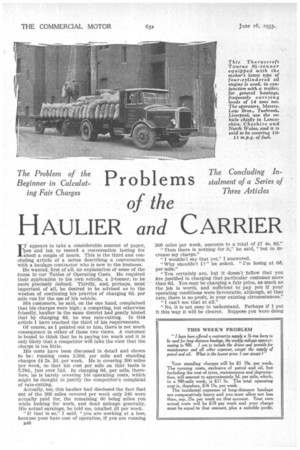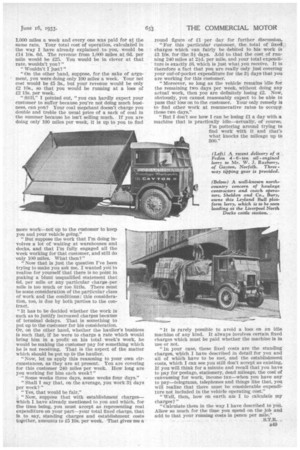Problems of the
Page 66

Page 67

If you've noticed an error in this article please click here to report it so we can fix it.
HAULIER and CARRIER I, T appears to take a considerable amount of paper, Ilen and ink to record a conversation lasting for about a couple of hours. This is the third and concluding article of a series describing a conversation with a haulage contractor who is new to the business.
He wanted, first of all, an explanation of some of the items in -our Tables of Operating Costs. He required their application to his own vehicle, a 2-tonner, to be more precisely defined. Thirdly, and, perhaps, most important of all, he desired to be advised as to the wisdom of continuing his practice of charging 6d. per mile run for the use of his vehicle.
His customers, he said, on the one hand, complained that his charges were high ; a competing, but otherwise friendly, haulier in the same district had gently hinted that by charging 6d. he was rate-cutting. In this article I have reached the third of his requirements.
Of course, as I pointed out to him, there is not much consequence in either of those two views. A customer is bound to think that he is paying too much and it is only likely that a competitor will take the view that the charge is too little.
His costs have been discussed in detail and shown to be: running costs 2.50d. per mile and standing charges £4 28. 2d. per week. He is covering 300 miles per week, so that his cost per mile on that basis is 5.78d., just over 5id. In charging 6d. per mile, therefore, he is barely covering his operating costs, which might be thought to justify the competitor's complaint of rate-cutting.
Actually, too, this haulier had disclosed the fact that out of the 300 miles covered per week only 240 were actually paid for, the remaining 60 being miles run while looking for work, and dead mileage generally. His actual earnings, he told me, totalled £6 per week.
"If that is so," I said, "you are working at a loss, because your bare cost of operation, if you are running 1348 300 miles per week, amounts to a total of £7 4s. 8d." "Then there is nothing for it," he said, "but to increase my charge." "I wouldn't say that yet," I answered.
"Why shouldn't I?" he asked. "I'm losing at 6d. per mile." "You certainly are, but it doesn't follow that you are justified in charging that particular customer more than 6d. You may be charging a fair price, as much as the job is worth, and sufficient to pay you if your operating conditions were favourable, although, at that rate, there is no profit, in your existing circumstances."
"I can't see that at all."
"No, it is not easy to understand. Perhaps if I put t this way it will be clearer. Suppose you were doing 1,000 miles a week and every one was paid for at the same rate. Your total cost of operation, calculated in the way I have already explained to you, would be £14 10s. 6d. The revenue from 1,000 miles at 6d. per nine would be £25. You would be in clover at that rate, wouldn't you?'
"Wouldn't I just?"
"On the other hand, suppose, for the sake of argument, you were doing only 100 miles a week. Your net cost would be £5 3s., but your revenue would be only £2 10s., so that you would be running at a loss of £2 13s, per week.
"Still," I pointed out, "you can hardly expect your customer to suffer because you're not doing much business, can you? Your coal inerchant doesn't charge you double and treble the usual price of a sack of coal in the summer because he isn't selling much. If you are doing only 100 miles per week, it is up to you to find more work—not up to the customer to keep you and your vehicle going."
"But suppose the work that I'm doing involves a lot of waiting at warehouses and docks, and that I'm fully engaged all the week working for that customer, and still do only 100 miles. What then?"
"Now that is just the question I've been trying to make you ask me. I wanted you to realize for yourself that there is no point in making a blunt unqualified statement that: 64.1. per mile or any particular charge-per mile is too much or too little. There must be some consideration of the particular class of work and the conditions: this consideration, too, is due by both parties to the contract.
" It has to be decided whether the work is such as to justify increased charges because of terminal delays. That is something to put up to the customer for his consideration. Jr, on the other hand, whether the haulier's business is such that, if he were to charge a rate which Would bring him in a profit on his total week's work, he would be making the customer pay for something which be is not receiving. That is the aspect of the matter which should be put up to the haulier.
"Now, let us apply this reasoning to your own circumstances, as they are at present. You are covering for this customer 240 miles per week. How long are you working for him each week?"
"Some weeks three days, some weeks four days." "Shall I say that, on the average, you work 31 days per week?"
"Yes, that would be fair."
"Now, suppose that with establishment charges— Which I have already mentioned to you and which, for the time being, you must accept as representing real expenditure on your part—your total fixed charge, that Is to say, standing charges and establishment costs together, amounts to £5 10s. per week. That gives me a round figure of 11 per day for further discussion.
"For this particular customer, the total of fixed; charges which can fairly be debited to his work • is £3 10s. for 'the 31 days. Add to that the cost, of running 240 miles at 21d. per mile, and your total expenditure is exactly £6, which is just what you receive. It is therefore a fact that you are really only just covering your out-of-pocket expenditure fOr the 31 days that you are working for this customer.
"Moreover, so long as the vehicle remains idle for the remaining two days per week, without doing any actual work, then you are definitely losing £2. Now, obviously, you cannot reasonably expect to be able to pass that loss on to the customer. Your only remedy is to find other work at remunerative rates to occupy those two days."
" But I don't see how I can be losing £1 a day with a machine that is practically idle—actually, of course; I'm pottering around trying to find work with it and that's what knocks the mileage up to 300."
"It is rarely possible to avoid a loss on an idle machine of any kind. It always involves certain fixed charges which must be paid whether the machine is in use or not.
"In your ease, these fixed costs are the standing charges, which I have described in detail for you and all of which have to be met, and the establishment costs, which I can see you still don't accept as existing. If you will think for a minute and recall that you have to pay for postage, stationery, dead mileage, the cost of canvassing for work, income tax—when you have any to pay—telegrams, telephones and things like that, you will realize that there must be considerable expenditure not included in the vehicle operating cost."
"Well, then, how on earth am I to calculate my charges?" "Calculate them in the Way I have described to yob. Allow so much for the time you spend on the job and add to that your running costs in pence per mile." ,S.T.R.
549 . ,






































































































